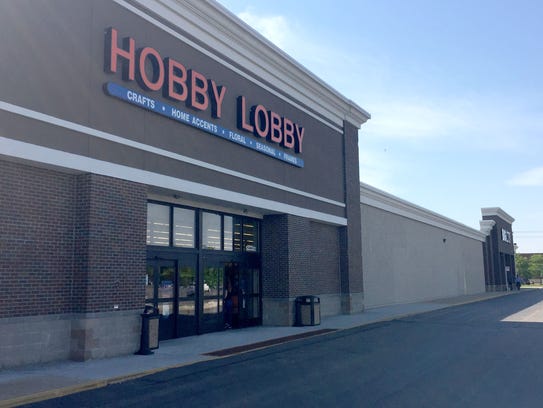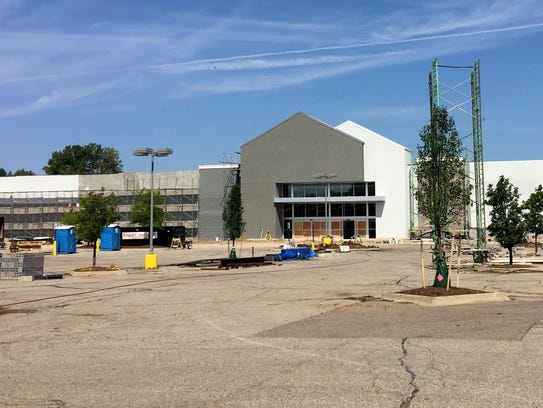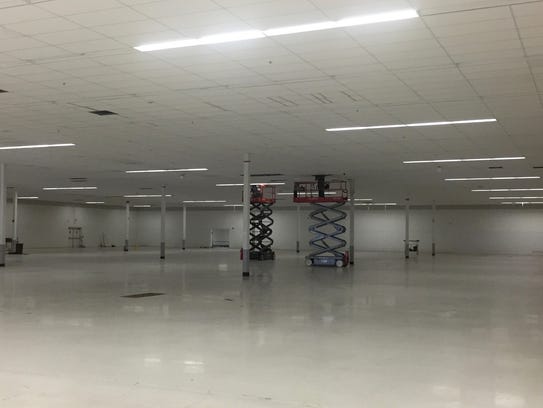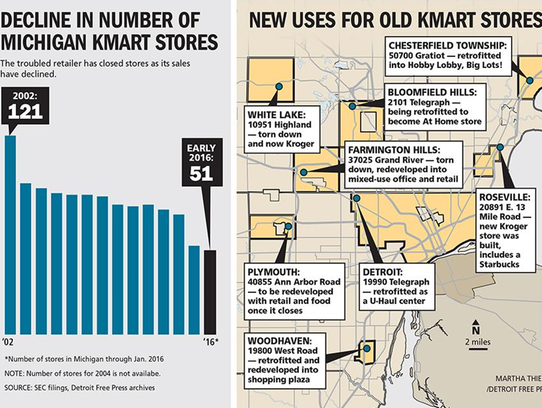A big retail store closure can be disastrous for a shopping center or business district, but there might be reason for hope and excitement when the store is a long-struggling Kmart.
Several Detroit suburbs are now home to promising redevelopments created from the ruins of abandoned Kmart stores. These projects fill in emptied big boxes and spin off new development in once-depressed shopping areas that haven’t attracted shoppers for years.
Real estate brokers say old Kmarts make good redevelopment prospects because they typically have good locations in high-trafficked areas.
“They were the first ones who did deals here, so they got the best real estate,” said Jim Stokas of Stokas Bieri Real Estate.
A Free Press survey in southeast Michigan found a variety of reuse examples, including stores subdivided and retrofitted for multiple smaller retailers, conversion into indoor storage businesses, takeover by a big tenant like At Home, and in three instances, demolition and replacement by new large-format Kroger Marketplace stores.
This phenomenon shows a cycle of life in commercial real estate — when older, once-popular retail chain stores are succeeded by fresh tenants whose brands and square footage are more competitive. In the case of Kmart, old discount stores bequeath convenient geographic locations and physical buildings that can be retrofitted for modern use.
“Kmart had some great locations, so they’re being repurposed to better tenants,” said Greg Newman, a principal at Keystone Commercial Real Estate based in Farmington Hills. “You are probably going to see extensive renovations done with the ones that are being repurposed because the buildings just looked old. They were dated and needed to be brought up.”
A 20th-Century retail phenomenon born in metro Detroit, Kmart has been shuttering stores here and across the nation the past two decades as the chain struggles amid competition from the likes of Amazon.com, Walmart, Meijer and other big retailers.
Some retail industry observers are bracing for a potential bankruptcy as early as next year of Kmart’s parent company, Sears Holdings. Such an event might entail a Blockbuster Video-style closure of many or all of the remaining 941 Kmart stores, including the 51 in Michigan, according to figures in Sears Holdings’ latest annual report.
Same-store sales for the Kmart brand — representing about 40% of Sears Holdings’ revenues — fell 4.2% in the first half of this year, reflecting a $187-million decline. The company announced in April that it would shutter an additional 68 Kmarts nationwide this summer as it accelerates the closing of unprofitable stores.
Kmart graphic, detailing the decline in Michigan Kmart stores, plus new uses for old Kmart stores in the Detroit area. (Photo: Martha Thierry, DFP)
“If they continue on this path, obviously the ultimate closure of their physical stores seems almost inevitable,” said Neil Stern, senior partner at McMillanDoolittle, a Chicago-based retail consulting firm.
But a Sears Holdings spokesman said the company is making progress in its journey back to profitability. The parent company of Kmart and Sears has reported improved pretax earnings, reduced operating expenses and is concentrating on its best-performing stores, he said.
“We are an asset-rich enterprise with multiple resources at our disposal to fund our transformation, including $4.7 billion of inventory already paid for, a substantial, valuable real estate portfolio and leading proprietary brands such as Kenmore, Craftsman and Diehard,” spokesman Howard Riefs said.
Originally founded in Detroit in 1899 as the S.S. Kresge Co., Kmart’s bankruptcy in 2002 led to its merger with Sears and relocation of its headquarters from Big Beaver Road in Troy to suburban Chicago.
In 2006, the company left behind a still-empty office complex in Troy near Somerset Collection.
New life for old stores
Whatever Kmart’s near-term financial future, local governments and developers are finding value in the old Kmart structures that, in many instances, were perceived as holding back business districts because the discount chain was no longer effective as a shopping center anchor.
The Chesterfield Township Kmart closed in 2012, leaving a pizza parlor and Payless Shoes as the only tenants in a shopping center on Gratiot near 23 Mile along a busy commercial corridor.

This Hobby Lobby is situated in part of a former Kmart store in Chesterfield Township. (Photo: JC Reindl, Detroit Free Press)
A new owner saw value and decided to subdivide the empty Kmart building into two retail spaces and upgrade the rest of the shopping center.
Today, the former Kmart building still stands but is renovated and filled by a Hobby Lobby and a Big Lots, both major retail chains. The once-dead shopping center is thriving with a new Planet Fitness gym, Cold Stone Creamery, Petco and other national retail merchants.
“Once Kmart left this was all desolate. Hardly anybody would ever go in here,” said Kathy Van Torre, owner of Creative Keepsakes Ceramics that neighbors the former Kmart. “Now it is all rebuilt, and we have new stores all going in.”
Developer David Przygoda bought the vacant Woodhaven Kmart property at West and Allen roads that had closed in 2013 and even housed squatters for a time.
Last year, he did an extensive redevelopment that reconfigured the early 1970s structure into five to six retail spaces. He also turned a section of giant parking lot into two new small retail strips — now mostly occupied.
“We brought it out of the doldrums of despair,” said the property’s leasing agent, Bob Mihelich of CBRE in Southfield.
Today, the new retail strips are filled with a Panera Bread, Panda Express, T-Mobile and other national chain tenants. The redeveloped former Kmart building now houses a dental office, a hair salon, a Lady Jane’s Haircuts for Men and a soon-to-open Black Rock steakhouse. Potential deals to bring in two additional midsize retail tenants are pending.
No longer eyesore
The redevelopment was a welcome sight for Woodhaven city officials, who watched with trepidation as the old Kmart fell into disrepair. The shuttered store had been hit by scrappers, and mattresses belonging to squatters were found inside.
“There were craters in the parking lot and the building was crumbling — it was really an eyesore to the city,” Mihelich said. “The mayor gave me a hug when we finally got it approved because they were so excited something was finally going to happen.”
Portage officials also were relieved to see their city’s former Kmart building given a second chance. The store closed in 2010 and was later subdivided and renovated into a Hobby Lobby and Dick’s Sporting Goods with an Aldi added in a 2014 addition. There are two small retail strips in Kmart’s old parking lot with a Jared jewelers and a Verizon store.
“So what was becoming a blight and a concern has completely turned around,” said Vicki Georgeau, Portage’s director of community development.
Some need space
Not all developers want to slice up old Kmarts into retail bays. That’s the case in Bloomfield Township, where the shell of the old Kmart on Telegraph in the Bloomfield Town Square shopping center is in the process of becoming At Home, a Texas-based home decor store chain.

A former Kmart building in Bloomfield Township that will become an At Home store. (Photo: JC Reindl, Detroit Free Press)
The vacant big box structure proved the big attraction in Detroit for U-Haul, which opened a moving and storage business this year inside the old Kmart at 19990 Telegraph, which closed in October 2014. The building was cleared out on a recent afternoon as crews worked to transform the inside into climate-controlled storage.
“It’s a good thing someone took it over; it’s been sitting idle for a couple years,” said Tim Holt, project manager for the U-Haul conversion.

The inside of a former Kmart in Detroit that U-Haul is turning into climate-controlled storage. (Photo: JC Reindl, Detroit Free Press)
That U-Haul deal was brokered by Southfield-based NAI Farbman, which is handling four to five other potential sales of old Kmart stores, according to Ron Goldstone, a senior vice president at the firm.
Some Kmart buyers, such as Kroger, admire the discount retailer’s large properties and locations but often want nothing to do with the leftover buildings.
In the past three years, Kroger has bulldozed three former metro Detroit Kmarts in Roseville, Commerce Township and White Lake Township, replacing them with new large-format Kroger Marketplace stores.
These new Krogers sell many non-grocery items — not unlike the merchandise still found in Kmarts — such as toys, kitchenware and school supplies. They measure about 120,000 square feet, compared with the 50,000 to 60,000 square feet of a traditional Kroger.
The newest of Kroger’s Marketplace trio is in White Lake Township, scheduled to open Sept. 21. That Kroger replaces a Kmart that featured a rare lime-green and gray color scheme and was heralded as Kmart’s “Store of the Future” in 2002, in the middle of the discount retailer’s bankruptcy. It closed in 2014.
“The Kmart sites are offering the acreage we’re looking for,” said Kroger’s Rachel Hurst, manager of consumer affairs. “I’m sure there will be more in the future.”



